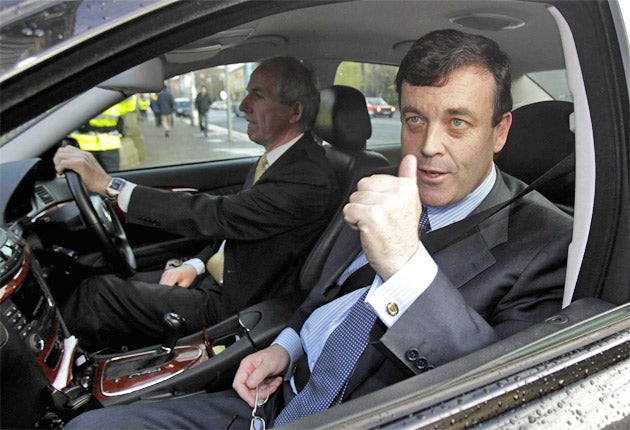Painful budget set to be Cowen's final act in office

Irish Prime Minister Brian Cowen was clinging to power in Dublin on a temporary basis yesterday as Ireland adjusted to this week's huge changes to its political and economic landscapes.
The next phase in a fast-moving political scene will come with today's publication of a government blueprint to cut €15bn (£12.7bn) over the next four years. The plan was yesterday finalised by the Irish cabinet. It is assumed to have the broad approval of the team from the EU, ECB and the IMF officials, which were drafted into Dublin last week in a financial rescue operation that deepened Ireland's already long-running political crisis.
It is also thought that the package will not be completely rejected by Ireland's major political parties, which have accepted that radical steps are needed to reduce the country's very large deficit.
Monday's fevered political activity, during which the embattled Mr Cowen was obliged to promise a general election in the new year, was followed by a day of intensive calculations within the political parties. His timetable is to win acceptance for the blueprint and then to pass a budget containing six billion euros' worth of cuts on 7 December. He may be able to do so, though success will depend on a complex interplay of political considerations.
Yesterday the message from the IMF and others was that speed and stability are highly desirable, but Mr Cowen is now regarded as a lame-duck premier who is described by some as a mere caretaker Prime Minister. Several members of his Fianna Fail party have said he should resign, but yesterday most of his backbenchers, seemed to agree that he should stay on until after the budget.
The markets were clearly unimpressed at his chances, registering declines, though Ladbrokes bookmakers took a more optimistic view. Their odds suggested that although they regard Mr Cowen personally as a beaten docket, they believe he can get his austerity plan and budget through before his departure from power.
The parliamentary arithmetic in the Dail is complex, with five parties and 10 independent members.
Fianna Fail is the largest party, governing with the support of the Greens and some of the 10 independents. The Greens have announced that they will be leaving the government, though not before supporting the four-year plan and the budget. Two of the independents who usually vote for Mr Cowen have declared they are highly unlikely to vote for the budget, while the stance of some others is obscure.
Sinn Fein, the only party which does not favour cuts, has tabled a motion of no confidence in Mr Cowen. Although the party may pick up a seat in a by-election later this week, it is regarded as being on the sidelines, holding just four seats.
The Republic's second-largest party, Fine Gael, could theoretically set out to block both the plan and the budget, but it is bound to be influenced by a distinct national mood which is emerging across Ireland.
The sense seems to be that the plan and the budget should go through, even though they will inevitably bring considerable financial pain. In Ireland it is appreciated that this is also the strong view of the financial institutions which now have a major say in its economy. This feeling is so marked that it will be one of the strongest cards left in Mr Cowen's hand.
Fine Gael in any event prides itself on its sense of responsibility, and will instinctively be against behaviour which could be presented as opportunistic or obstructionist. It will also know this would bring swift punishment at the hands of voters in next year's election.
The mood was reflected in the language used by many politicians yesterday, though not by a long-time Cowen critic, the Fianna Fail backbencher Noel O'Flynn. He said his opposition to the Prime Minister "is going to be all bare-knuckle, I can assure you". But he added that he would support Mr Cowen in any vote of no-confidence.
Ireland's political parties
Fianna Fáil
The largest party in parliament, Fianna Fáil is led by Brian Cowen, the Prime Minister. It was founded by the republican leader Éamon de Valera in 1926.
Fine Gael
The centre-right Fine Gael is Ireland's main opposition party, which has been out of power since 1997. It has the greatest number of local councillors and Irish MEPs.
Labour Party
The Labour Party has previously formed coalitions with both Fianna Fáil and, more frequently, with Fine Gael. It merged with the smaller Democratic Left party in 1999.
Green Party
A junior member of the governing coalition, the Green Party won its first seat in 1989. The current Communications and Environment cabinet ministers are Green MPs.
Sinn Féin
Previously linked to the IRA, Sinn Féin has seen its support increase since it began to back the Northern Ireland peace process. It has four MPs in the Dublin parliament.
Subscribe to Independent Premium to bookmark this article
Want to bookmark your favourite articles and stories to read or reference later? Start your Independent Premium subscription today.

Join our commenting forum
Join thought-provoking conversations, follow other Independent readers and see their replies